

Professor Ray Kinsella and members of the group Mothers and Fathers Matter protest outside the Dáil. Pic: John Mc Elroy.
Archbishop Eamon Martin, Primate of All Ireland
On 22 May the people of Ireland will vote on whether to amend the constitution to add the following to Article 41:
“Marriage may be contracted in accordance with law by two persons without distinction as to their sex.”
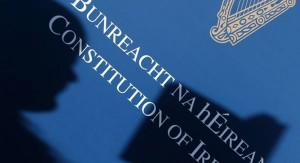 Article 41 of the Constitution
Article 41 of the Constitution
THE FAMILY
According to the Referendum Commission, the effect of this proposal if it is passed will be:
– Two people of the opposite sex or of the same sex will be able to marry each other.
– The other detailed rules about who may marry will continue to be set out in legislation.
– The Constitutional status of marriage will remain unchanged.
– A marriage between two people of the same sex will have the same status under the Constitution as a marriage between a man and a woman.
– Married couples of the opposite sex or of the same sex will be recognised as a family and be entitled to the Constitutional protection for families.
[youtube http://www.youtube.com/watch?v=JUL-mn0pmks]
The Catholic Church through the Irish bishops as well as groups such as the Iona Institute, Mothers and Fathers Matter and First Families First have raised a number of concerns about the possible effects of such far reaching change and therefore are urging people to vote No.
Last December, the Irish Episcopal Conference launched a 16-page pastoral statement outlining the Church’s views and teachings on marriage and explaining why it is opposed to any redefinition of marriage by the referendum.
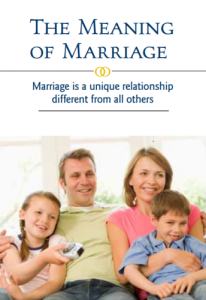 In ‘The Meaning of Marriage’ the bishops state, “Marriage is a unique relationship different from all others” and that “to seek to re-define the nature of marriage would be to undermine it as the fundamental building block of our society”.
In ‘The Meaning of Marriage’ the bishops state, “Marriage is a unique relationship different from all others” and that “to seek to re-define the nature of marriage would be to undermine it as the fundamental building block of our society”.
They acknowledge that those who call for legal recognition of same-sex marriage see it as a matter of fairness, equality and civil rights.
However, “The Church holds that basic human rights must be afforded to all people. This can and should be done without sacrificing the institution of marriage and family and the fundamental role they play in society.”
“Children have a right to grow up in a family with a father and a mother capable of creating a suitable environment for the child’s growth and emotional development.”
The bishops reiterated their opposition to any “amendment to the Constitution which redefines marriage” in March when they published another statement – ‘Marriage is important – Reflect before you change it’.
Launching the statement, Archbishop Eamon Martin, president of the Irish Bishops Conference, said the forthcoming referendum was about amending the Constitution in a way which “effectively places the union of two men, or two women, on a par with the marriage relationship between a husband and wife which is open to the procreation of children”.
He said they could not support such a proposal.
The statement highlighted that marriage is of fundamental importance for children, mothers and fathers, and society.
“All of us need to reflect deeply before changing it,” the bishops said.
They also appealed to the people of Ireland to consider very carefully the profound implications which this constitutional amendment would have on the family environment and the understanding of parenthood.
Mothers and fathers bring different, yet complementary gifts and strengths into a child’s life, they said.
In recent weeks, many bishops have issued statements and pastoral letters to the faithful in their own dioceses outlining their concerns over the referendum proposal.
Primate of All Ireland, Archbishop Eamon Martin of Armagh
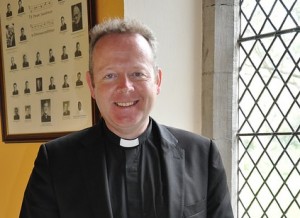 The Primate of All Ireland has raised concerns over the lack of freedom of speech for those who support the No side in the marriage referendum.
The Primate of All Ireland has raised concerns over the lack of freedom of speech for those who support the No side in the marriage referendum.
In his message ‘Care for the Covenant of Marriage’, Archbishop Eamon Martin asked, “How have we got ourselves into the situation that when people stand up to guard the dignity of difference between a man and woman, and speak for the traditional definition of marriage, they are often portrayed as being against freedom, or against equality?”
“How is it that many people won’t even raise these issues in their families and workplaces for fear of being ridiculed or condemned as homophobic?”
He also challenged the country’s politicians asking, “Could we not expect at least some of our legislators to engage in public discussion on both sides of this debate?”
He said that people of faith believe that the union of a man and a woman in marriage, open to the procreation of children, is a gift from God who created us ‘male and female’.
“But we are also people of reason, who hold to the truth about human sexuality, grounded in the natural law, that the relationship between a man and a woman is unique.”
Discussing the equality argument put forward by the Yes side, Archbishop Martin said what makes marriage unique among other types of relationship is the distinctiveness of the union between a man and a woman which is open to life.
“To remove this specific difference is not, as some would argue, a development or evolution of our understanding of marriage; it is, rather, a very definite break with human history and with the natural institution of marriage.”
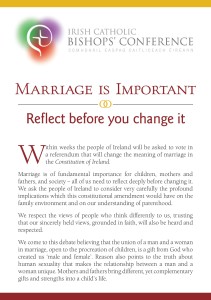 He warned that in this situation we end up using the term “marriage” for something that it is not.
He warned that in this situation we end up using the term “marriage” for something that it is not.
According to the Archbishop of Armagh, many of the arguments being made for the proposed amendment appear to be based on a misunderstanding of “equality”.
“It is a fact of nature that same-sex unions are fundamentally and objectively different from the complementary sexual union of a woman and a man which is, of itself, naturally open to life.”
He underlined that in the current debate we are all conscious of same-sex partners who love each other and wish to share their life together.
However, he highlighted that marriage is about much more than a loving relationship between consenting adults.
“Marriage has another essential element – the openness to children who are born of the love and sexual relationship of their mother and father. This is why, as Article 41:3:1 of the Constitution puts it: ‘The State pledges itself to guard with special care the institution of Marriage, on which the Family is founded, and to protect it against attack.’”
He said the State encourages and favours the marriage of a man and a woman, open to children, because it is for the common good. It not only satisfies individual love and needs, but it also ensures the future of society and forms the ideal environment for the development of children.
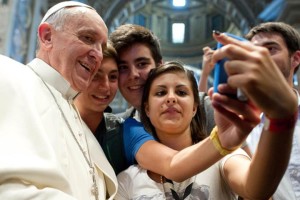 Referring to Pope Francis’ recent statement that a perfect family does not exist, the Primate of All Ireland acknowledged that many families experience great trials, and struggle with wounded relationships and disappointments and that tensions and loneliness can build up within the home.
Referring to Pope Francis’ recent statement that a perfect family does not exist, the Primate of All Ireland acknowledged that many families experience great trials, and struggle with wounded relationships and disappointments and that tensions and loneliness can build up within the home.
The marriage relationship does not always ‘work out’ as hoped for. Sadly, and despite their best intentions, many married couples separate, often for the good of their children and for their own well-being.
He added, we also know that many parents are generously and successfully raising children on their own, and many others are giving great love and joy to children through adoption and fostering.
“This does not mean, however, that we should not continue to hold up the example of a faithful, life-long and committed marriage relationship between a man and a woman as something beautiful and special.”
According to the Archbishop, society should do everything in its power to support and encourage this unique union so that as many children as possible can have a father and a mother who live together in a relationship marked by stability and love.
Elsewhere in his address, Archbishop Martin said that some commentators have said that ‘sacramental’ or ‘religious’ marriage is not affected by the proposed amendment.
“It is important to remember that religious freedom means much more than simply the freedom to worship or have ceremonies of a particular type,” he said.
“Freedom of religion is linked very closely to freedom of conscience and freedom to express publicly our values and beliefs in daily life.”
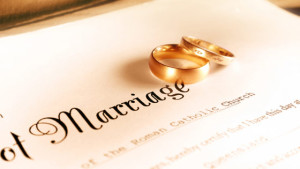 “If society adopts and imposes a ‘new orthodoxy’ of ‘gender-neutral’ marriage, being defined simply as a union between any two persons – including a man and a man, or a woman and woman – then it will become increasingly difficult to speak or teach in public about marriage as being between a man and a woman,” Dr Martin warned.
“If society adopts and imposes a ‘new orthodoxy’ of ‘gender-neutral’ marriage, being defined simply as a union between any two persons – including a man and a man, or a woman and woman – then it will become increasingly difficult to speak or teach in public about marriage as being between a man and a woman,” Dr Martin warned.
“Will there be lawsuits against individuals and groups who do not share this vision? What will we be expected to teach children in school about marriage or about homosexual acts?” he asked.
“Will those who continue to sincerely believe that marriage is between a man and a woman be forced to act against their faith and conscience?”
He encouraged everyone to reflect and pray carefully about these issues before voting on 22 May and added that it was very important to vote.
“Do not be afraid to speak up courageously for the union of a man and a woman in marriage,” he exhorted
Primate of Ireland, Archbishop Diarmuid Martin of Dublin
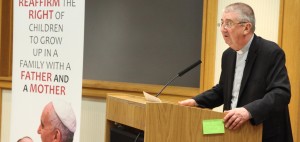
Archbishop Diarmuid Martin gives his address on the theme ‘The Teaching of the Church on Marriage Today’. Pic John McElroy.
Outlining his reasons for voting No in the marriage referendum, Archbishop Diarmuid Martin of Dublin said the proposal is not simply about extending accessibility to marriage but a real change in the definition of marriage.
In his address, ‘Marriage in the Constitution is Linked with the Family’ at All Hallows College, the Archbishop once again highlighted that genetic parentage is not irrelevant to the debate.
“We are all children of a male and a female and this must have relevance to our understanding of the way children should be nurtured and educated,” he stated and added that genetic make-up is a fundamental dimension of the intergenerational reality of family.
He told diocesan communications officers from around the country that no person exists who is not the fruit of a male and a female.
“Even if it were possible to clone a child, that child would still bear the genetic imprint of a male and a female. An individual man or an individual woman cannot generate another human being just on their own,” he said.
Elsewhere in his address, the Archbishop of Dublin asked what it means to be male and female.
Questioning if it simply a social construct, he acknowledged that there are some social constructs around the roles of men and women which have evolved in our societies which do not reflect the true understanding of men and women and which must be changed.

At the Shrine of St Valentine in Whitefriar St in Dublin, engaged couple Leona Gallagher from Castledawson Co Derry and Paul McNulty from Beaumont in Dublin were blessed by Bishop Denis Nulty. Pic John Mc Elroy.
He explained that stressing the fundamental male – female relationship of complementarity does not mean wanting to put women back in the kitchen or pay them a lower wage.
“The fundamental male/female relationship inevitably has significance when we come to reflection of generating and nurturing children,” he said and highlighted that the generation of children is not just about biology.
However, he added that this is not the same as saying that people in differing marital and other relationships cannot be good parents, much less to deny that they even deserve the title parents.
Nor does it mean that all heterosexual parents are by that fact alone automatically good parents.
“It is important always to stress that all children, whatever the circumstances of their birth, should be loved unconditionally and treated with the same rights and dignity. This applies also to their rights within the Church,” he said.
Acknowledging that there is no formal definition of marriage in the Constitution, Archbishop Martin said the consistent legal interpretation of the Constitution is that it refers to a marriage between a man and a woman and that this recognition is fundamental and goes beyond any particular understanding of marriage that may have existed at the time of the writing of the Constitution.
The proposed change to the definition of marriage has significance for all citizens, he said and added that you cannot take one article of the Constitution in isolation.
“Marriage is not simply about a wedding ceremony or about two people being in love with each other.”
“Marriage, in the Constitution, is linked with the family and with a concept of family and to the mutuality of man and women which is the fundamental foundation for the family as it exists in the constitution today.”
 Such fundamental questions about the good of society are clearly the concern of all, he said.
Such fundamental questions about the good of society are clearly the concern of all, he said.
Elsewhere, Archbishop Diarmuid Martin criticised politicians who respond to the concerns of the No side with “broken gramophone-like quick sound-bites” and avoid rational debate.
In his address at All Hallows College, the Primate of Ireland said the fact that the Church was dogmatic in the past did not justify politicians replacing “sound bite-ism” for dogmatism.
He said the sound-bite culture couldn’t minimise the significance of what would change if the referendum is passed.
On the proposed change to Article 41, Dr Martin argued that an ethics of equality does not require uniformity and this did not preclude recognition and respect of difference.
“A pluralist society can be creative in finding ways in which people of same-sex orientation have their rights and their loving and caring relationships recognised and cherished in a culture of difference, while respecting the uniqueness of the male-female relationship,” he said.
“I know that the harshness with which the Irish Church treated gay and lesbian people in the past – and in some cases still today – may make it hard for LGBT people to accept that I am sincere in what I am proposing,” he acknowledged.
This is made more complex when language is used which is insensitive and overly judgemental, he said and warned that the Church has to learn to voice its criticism clearly and without fear, but it must always do so in language which respects her Master.
Archbishop Michael Neary of Tuam
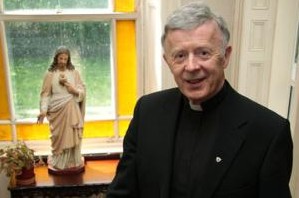 In his statement to the faithful in Tuam, In Support of the Christian View of Marriage, Archbishop Neary said the Church’s opposition to the redefinition of marriage is not due to a conservative viewpoint or wilfully inhibiting genuine progress.
In his statement to the faithful in Tuam, In Support of the Christian View of Marriage, Archbishop Neary said the Church’s opposition to the redefinition of marriage is not due to a conservative viewpoint or wilfully inhibiting genuine progress.
“We are not being mean-spirited towards those who have same-sex attractions. On the contrary, we regard marriage as the central and crucial social relationship, which is of natural law and plays an indispensable part in human life.”
He said this was seen nowhere more than in pro-creation and the parenting of children and he added that what happens in marriage serves the common good of both the man and the woman and society itself.
“Our view of Christian marriage, properly explained and understood, is not in any way disrespectful of people who experience same-sex attraction. As a Church we believe every person is equal in the sight of God and should always be treated with love, dignity and respect,” Dr Neary said.
Elsewhere, Archbishop Neary admitted, “There is no denying the fact that marriage faces difficulties throughout the Western world today. These pressures impinge on all, but particularly on children.”
He said the forthcoming referendum was asking people not just to redefine marriage, but also to deprive children of the right to grow up in a family with a mother and a father.
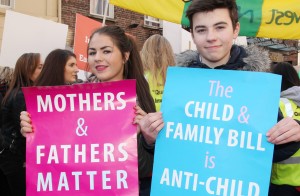
Mothers and Fathers Matter group held a lunchtime gathering outside the Dail as the Children and Family relationships (CFR) Bill was presented to Cabinet. Pic shows Chloe McKenna from Crossmaglen and Michael Malone from Co Meath. Pic John Mc Elroy.
“Following the Referendum on Children’s Rights our laws now enshrine the principle that, in all decisions relating to a child, the welfare of the child must be paramount,” he warned.
“A society that identifies the two parties in marriage as spouse I and spouse II has lost sight of a deep truth of human nature,” he criticised.
The Archbishop of Tuam asked if the complementary roles of mothers and fathers mattered in the upbringing of children. “Are we going to be the first generation in human history to say that mothers and fathers don’t matter anymore in the upbringing of children?”
He cited Pope Francis who he said has been very clear in saying the family is the foundation of co-existence and a guarantee against social fragmentation.
“Children have a right to grow up in a family with a father and a mother capable of creating a suitable environment for the child’s development and emotional maturity. This referendum is not and should not be about judging the various family types which have always existed as a reality in Ireland.”
“Married parents and single parents deserve as much support as possible as they live out the challenging vocation of parenthood. It is a referendum, however, which is seeking to redefine the very values underpinning our faith-based and cultural understanding of marriage itself, the consequences of which will impact upon our future generations,” he commented.
In saying this, the Archbishop said the Church was not disparaging anyone, nor is it being disrespectful to same-sex relationships.
“Despite what we are led to believe this referendum is not about same-sex relationships or about equality, but about the family.”
Civil partnerships have already been introduced which give same-sex couples the same rights as heterosexual couples in terms of inheritance rights, next-of-kin status, employment, and tax related benefits he highlighted.
 Elsewhere in his statement he said we were being told that we must introduce this redefinition of marriage because lots of other countries have.
Elsewhere in his statement he said we were being told that we must introduce this redefinition of marriage because lots of other countries have.
“In fact only one quarter of European countries have done so and none by a popular vote. Indeed, it has been defeated whenever it has been put to the people,” he stated.
He also explained that contrary to popular belief same-sex marriage is not a human right. “The highest human rights court in Europe is the European Court of Human Rights and it has found that there is no right to same-sex marriage in the Convention on Human Rights. States are free to make a distinction in their own laws between marriage and same-sex unions.”
The point should be made that many people who are not Catholic and indeed might rarely find themselves aligned with the Church on any subject have expressed misgivings about the purpose of the referendum and the manner in which the Government has prepared for it and in which some sections of the media have conducted and facilitated debate in its regard, Archbishop Neary said.
Bishop Leo O’Reilly of Kilmore
Bishop Leo O’Reilly of Kilmore has expressed concern for the future of ACCORD and the ethos of Catholic schools if the referendum on marriage is passed later this month.
In his statement he urged the faithful to think of the wider consequences of the referendum passing.
Urging people to vote No to the proposed amendment to the constitution, he stated “I have serious concerns about the blunt refusal to give any real guarantees regarding freedom of religion in relation to the referendum,” he warned.
He also questioned whether teachers would be obliged, against their conscience, to teach the new understanding of marriage in schools?
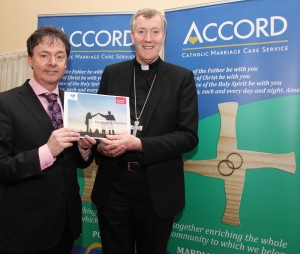
Bishop Denis Nulty, President of Accord, at the launch of Amárach’s research findings on Irish attitudes to marriage and the family with Gerard O’Neill from Amarach Research in Whitefriar St Church in Dublin. Pic John Mc Elroy.
In a reference to ACCORD, the catholic marriage agency, Dr O’Reilly asked if marriage counsellors and others who offer couples Catholic marriage care would be required to “provide services to those who are manifestly at variance with our ethos”.
The bishop, who said he was aware that the referendum was a very sensitive issue and expressed his hope that his words would not give offence to anybody, asked if priests, who are now generally registered as official solemnisers of marriage on behalf of the State, would be obliged to marry same-sex couples who request it?
“If a baker can be brought before the courts in Northern Ireland on such a trivial matter as refusing a request from a same-sex couple to supply a cake with a gay slogan, we can be sure that a priest will soon find himself in the same position here,” he commented.
Full text of Bishop Leo O’Reilly’s pastoral statement: ‘Marriage is Important – Think before you vote‘.
Bishop Brendan Leahy here:
Bishop Michael Smith here:
Bishop Denis Nulty here:
Bishop Ray Browne here:
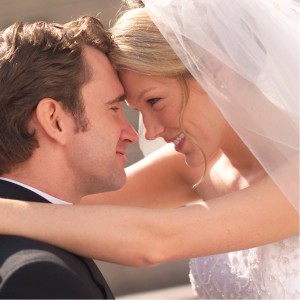 Bishop John Buckley here:
Bishop John Buckley here:
Bishop Phonsie Cullinan here:
Bishop Philip Boyce here:
Bishop John Kirby here:
Also of interest
– Senior lawyers call for No vote in referendum
– Anger as psychologist likens No voters to Nazis
– Primate reiterates opposition to referendum proposal
– Tusla withdraws funding for Accord’s pre marriage courses
– “I ached for my father”: woman raised by lesbians.
– First Families First calls for No in Referendum.
– Same sex marriages will have ‘right to procreate’.
– Tánaiste fails to endorse motherhood & fatherhood.
– Mothers & Fathers Matter call for No vote.
– Church may opt out of marriage registration role.